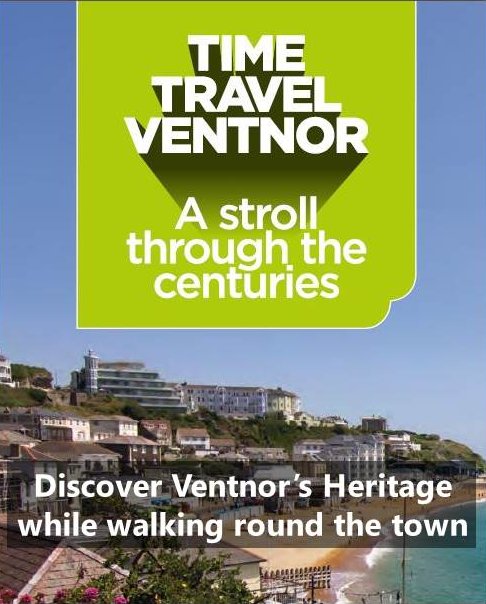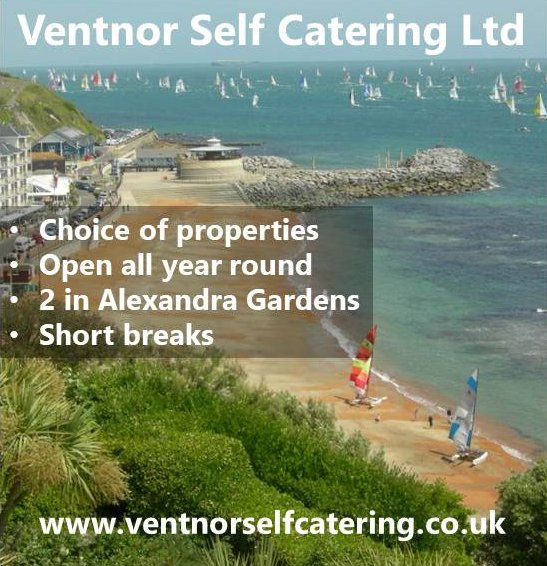‘Below Stairs’ in Alexandra Gardens
As a child Robin Turney lived in number 2 Alexandra Gardens which his parents kept as a guest house. Here he describes life in those days.
The move to No 2 Alexandra Gardens, then called ‘Rosetta’ was a major one for my Mum and Dad, my younger sister Margaret and for me. We were moving from a small semi in the London suburbs to a very different life. My parents had some knowledge of the Island from visits to St Lawrence before the war but this move, in 1947, was entirely different. Neither my mother nor my father had any experience of the hotel industry and my father, who worked as a sales assistant in a London department store, Gamage’s, had returned from wartime service in Egypt and Israel with no wish to go back to the daily commute into London.
There were some very clear advantages for a seven year old, we were to live by the sea and the house seemed to be enormous, but there were also disadvantages, I had to give up my tricycle, a wise move by Mum and Dad in view of the closeness to the cascade, and I would be leaving all my friends at the infant school in Middlesex.
At that time Rosetta was probably typical of many guest houses in Ventnor. Our visitors usually stayed for either one or two weeks and arrived at Ventnor by train every Saturday popping out of the tunnel into the old Ventnor Town station. Rosetta offered morning tea in bed and three meals a day. Guests spent much of their time on the beach which has changed very little over the years apart from the loss of the pier. (When we arrived the pier had a section missing, removed at the start of the war to deter invasion) Time on the beach was interspersed with walks either in the park or to Bonchurch or Steephill.
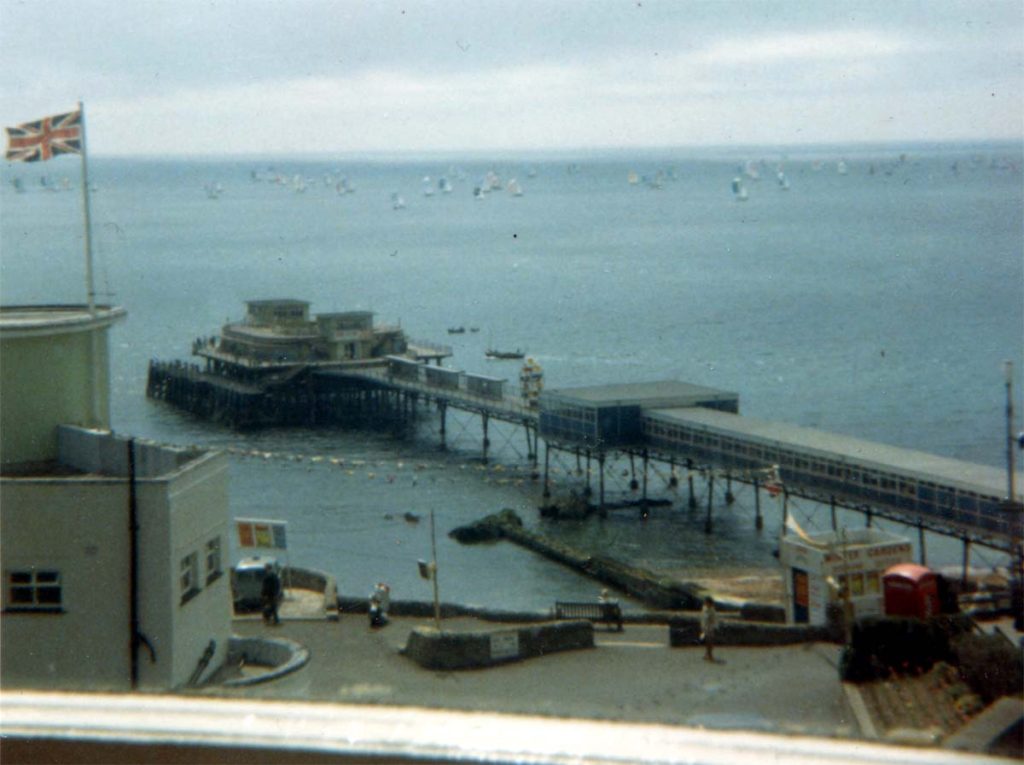
Ventnor Pier from number 3, 1960’s
Photo courtesy of Doreen Buck
Coach trips were also very popular and just opposite Alexandra Gardens ‘Harry’ ran a booking office for Randall’s coaches. Popular trips even then were to Blackgang Chine or to the coloured sands at Alum Bay with some taking a one day ‘Round the Island’ trip or an evening ‘Mystery Tour’.
We arrived in the September giving my parents six months to prepare for visitors. That first winter was very cold and even Ventnor had snow. This covered the cascade and Dad made me a sledge which I used to go down the cascade, down the footpath! Although for a seven year old this was great fun I now look at the drop over the edge with some horror and wonder if Mum and Dad knew what I was up to.
My main memory from the very early days is of the size of the main rooms with their high ceilings, intricate coving and large windows overlooking the sea. However despite the extra space we only lived in a very small part of the house. To start with Margaret had a bed in my parent’s room on the ground floor, where the guest lounge was situated, whilst I had a single bedroom on the first floor, later Margaret would move to the first floor and I would have a bed on the top floor. In the Winter nobody else was on the top floor and in the dark I can remember the rush up the stairs into the bedroom where I would slam the door and put on the light. Guest bedrooms were on the second and top floors with the bathroom, only available on request, also on the top floor. The house was quite modern in that all bedrooms had a wash basin with hot and cold water although central heating was unheard of at that time.
As a family we spent our time in the basement, mostly in the kitchen, and in the winter in the adjacent guest dining room which had a window below ground level into the front garden. These were very cosy rooms. The kitchen was dominated by a central kitchen table, the gas cooker and a large black coke boiler which provided the hot water. This meant that it was always warm in the winter but since the boiler also had to be kept going throughout the summer it was often far too hot.
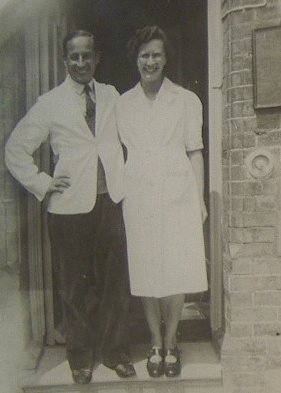
Mr & Mrs Turney
My Dad was always very good with his hands and as well as painting and decorating the rooms he made some changes. One of the front bedrooms had an enormous Victorian wardrobe with three mirrored doors all finished in mahogany veneer. This was cut down and ended up as three separate wardrobes. In the lounge the settee and chairs were covered in worn leather which was replaced by fabric. However the old leather was deemed to be too good to waste and it was used to make a school satchel for me along with leather waistcoat for Dad. The house also had many old artefacts and one exciting find was a couple of First World War bayonets with blades about twelve inches long which I was allowed to play with as ‘toy’ swords.
In the summer our living area became even smaller with the lounge and dining room being ‘out of bounds’ and my sister and I were restricted to the kitchen apart from our time in bed. For Mum and Dad it was a very busy time. It started with tea in bed for the guests followed by a cooked breakfast at 8:30. Once this was over Mum had to start on the lunch for up to 12 guests, they then had short break in the afternoon before starting to cook the evening meal which was served at 6:30. Mum was an excellent cook and I can still remember some of her dishes including roasts and carrot and cheese flan. Dad did the waiting and the washing up. There were however problems. Food rationing was still in force when we arrived and it was necessary to obtain coupons from the guests even for basics such as butter and sugar. This lead to experiments with other foods such as whale meat, not liked or eaten by anyone, and the preserving of dozens of eggs by dipping them in isinglass in the spring to provide enough for the summer period.
The front door was reserved for visitors and we always used the back door from the small yard. The only exception I can remember was on Sundays when Margaret and I, in our Sunday best, used the front door to go to the Baptist Sunday School across the road. The other occasion when Margaret and I would come to the front hall was when guests left on the Saturday in the hope of sixpence (2.5p) or a shilling (5p) from guests to boost our pocket money. I can always remember that Margaret was much better than I at talking to the guests, and at getting tips.
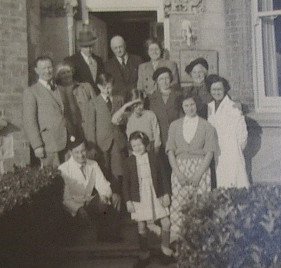
Family and guests outside Rosetta
A small putting green was laid out on the gardens and a few putters were kept in the hall for guests. When no guests were putting it made a great space for cricket with my friends.
A major problem was that the ‘Season’ was very short. Some visitors arrived for a holiday over Easter but the main influx of visitors was between Whitsun and mid September. This short period made it very difficult to earn enough to keep a family for the whole year and after five years my father took a job managing Clark’s radio, TV and bicycle shop. Whilst this brought in extra money it put an extra load on my mother and after a further 2 years we moved out of ‘Rosetta’ to live in ‘Caerbroc’ in Mitchell Avenue.
